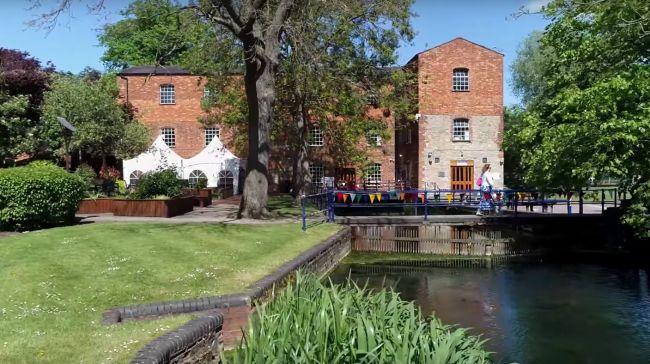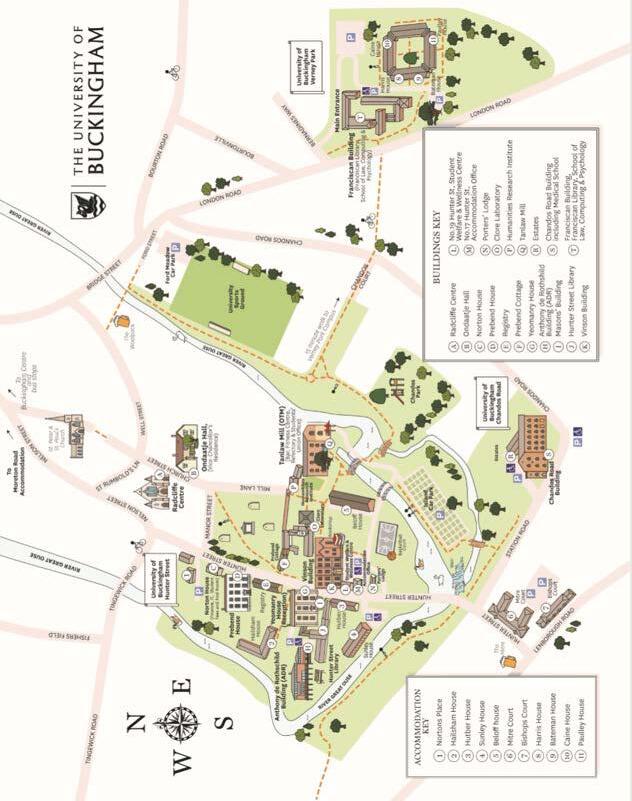Graduate Study in MILITARY HISTORY





The University of Buckingham’s Master’s and PhD programmes in Military History offers the opportunity to pursue research in a wide range of war-related topics from the early eighteenth century to 1945. Individual research and writing is complemented by a series of seminars by visiting lecturers of international repute. The choice of subject area is ultimately the student’s own, but taken with the advice of his or her prospective supervisor.
The programme was enthusiastically reviewed by The Financial Times, which noted that ‘intellectually curious professionals are signing up for a new course that gives them the opportunity
to exchange thoughts on security, diplomacy and the armed forces over dinner with stellar historians and military top brass.’
The degree is awarded solely on the basis of the dissertation (there are no ‘exams’), and the relationship between student and supervisor is therefore at the heart of the course. The maximum length for the MA dissertation recommended by the School of Humanities is 25,000 words, excluding notes and references; and 80,000 words for the PhD. Student and supervisor meet regularly on a one-to-one basis to discuss, plan, and review the dissertation as it develops through the year.
Some students know from the outset the precise subject on which they intend to work. For most, however, the definition of a research proposal is usually a gradual process, with the student starting with a general area of interest, and then focusing on a more closely defined topic as a result of further reading and consultation, usually with the Course Director. Most students do not arrive at the final title of their dissertation until towards the end of the first Term just before Christmas. It is not necessary to have the thesis topic defined at the time of application.
The Course Director is available to offer advice to prospective students who would like to discuss possible subjects for their research before they apply. He can be reached directly by email at gary.sheffield@buckingham.ac.uk
Below: David Low’s cartoon satirizing the Molotov-Ribbentrop Pact of 1939.
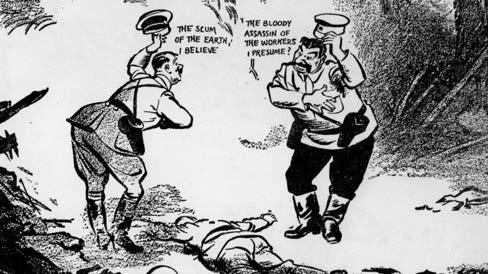
Private research and supervision are accompanied with a rich programme of seminars which give students direct access to some of the United Kingdom’s most distinguished scholars of military history. These take place at the Caledonian Club, 9 Halkin Street, near Hyde Park Corner, in central London. (see infra for further details).
starts at 6:30 pm, with an illustrated presentation by the visiting speaker and is followed by a 40-minute questionand-answer session. There is a break for drinks and then a seated dinner follows (three courses with wine) during which there is further questioning of the speaker and a general conversation about the topic in hand. (The cost of all dinners is included within the fee.)
The seminars are of course academic events, with a talk by a visiting expert; but they also have a social dimension, bringing research students and senior scholars together to discuss matters of common interest in an informal and congenial atmosphere. Each seminar
This year’s seminars explore a broad range of topics, ranging from the Duke of Marlborough at the beginning of the eighteenth-century to the Greek Civil War (1944-49).
Opposite: Sir Winston Churchill in 1948.
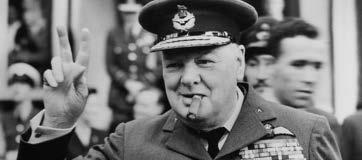
All seminars run from 6:30-8:00 pm, followed by dinner at 8:15 pm.
• Monday 9 October 2023 Professor Matthias Strohn (University of Buckingham) ‘The Thirty Years War and the Emergence of Modern Warfare’.
• Monday 23 October 2023 Dr Spencer Jones (University of Wolverhampton), ‘The Battle of Mons 1914 in British History’.
• Monday 6 November 2023 Dr Jennifer Wellington (University College Dublin) ‘Exhibiting War: The First World War, Museums, and Memory’.
• Monday 20 November 2023 Professor Sir Hew Strachan (University of St Andrews) ‘The First World War and the Ukraine War’.
• Monday 4 December 2023 Professor Gary Sheffield (University of Buckingham) ‘The British Empire Soldier in the Desert in the Second World War’.
• Monday 22 January 2024 Professor Richard Overy (University of Exeter), ‘Why War?’
• Monday 5 February 2024 Megan Hamilton (King’s College London/Imperial War Museum) ‘Training the Troops: British and Imperial Armies in the Second World War’ Followed by dinner at 8.15pm
• Monday 19 February 2024 Professor Jeremy Black (University of Exeter)
‘The Making of the World Naval Power,1500-1900’. Followed by dinner at 8.15pm
• Monday 4 March 2024 Mr Sebastian Cox (Head of Air Historical Branch, Royal Air Force) ‘The Experience of Allied Bomber Crews in the Strategic Air Offensive Against Germany, 1939-45’.
• 18 March 2024 Professor Saul David (Independent Scholar) ‘The Siege of Delhi, 1857’.
Professor Saul David (opposite) is the former director of the MA in Military History by Research and Professor of Military History at the University of Buckingham. His books include Victoria’s Wars, Crucible of Hell and SBS: Silent Warriors.
Dr Spencer Jones is Senior Lecturer at the University of Wolverhampton. His books include Boer War to World War and his edited volume Stemming the Tide: Officers and Leadership in the British Expeditionary Force 1914, which was runner-up for the Templer Medal in 2014.
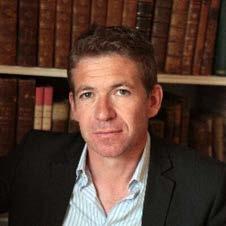
The Chief. He is director of the MA in Military History by Research, and Visiting Professor of Military History at the University of Buckingham.
Professor Sir Hew Strachan FBA (below) is on the Chief of Defence Staff’s strategic advisory panel and is
Professor Richard Overy FBA is the acclaimed author of The Dictators and The Bombing War, and formerly Professor of Modern History, University of Exeter.
Professor Gary Sheffield is a leading historian of the First World War whose books include Forgotten Victory and
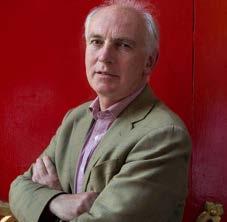
Professor of International Relations at the University of St Andrews. His books include The Politics of the British Army and The First World War.
Professor Matthias Strohn is a Lieutenant Colonel in the German
Army, a member of the military attaché reserve and Visiting Professor of Military Studies at the University of Buckingham’s Humanities Research Institute.
Below: a member of the Observer Corps scans the skies for enemy aircraft, 1940.

Seminars and Dinners
Seminars and dinners take place at the Caledonian Club (above), 9 Halkin Street, London, SW1X 7DR. View the location on Google Maps. Nearest Tube Stations: Hyde Park Corner, Victoria.
Tutorials
Tutorials usually take place at the University’s offices in Bloomsbury (51 Gower St, London, WC1E 6HJ) or can take place online if the student prefers.
Below: The Caledonian Club, Belgravia.
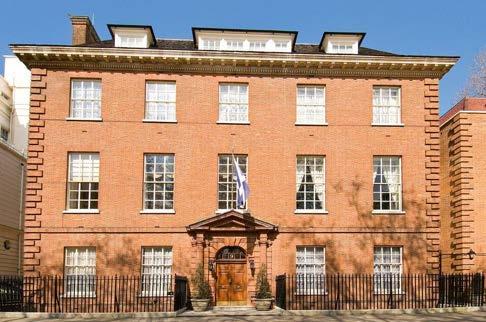
In addition to the seminar programmes and students’ one-to-one meetings with their supervisor, the programme also offers specialist classes on thesiswriting, referencing, and on how to use archival and on-line research resources. For those who need to work with
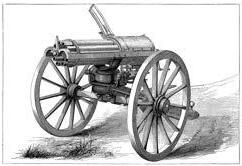
manuscripts (from the Tudor period and later), there is also a series of classes on palaeography (the reading of early handwriting) that will enable students to acquire fluency in the reading of manuscript sources.
Students who wish to take their Master’s-level research further have the opportunity, at the end of their year of MA studies, to extend their studies to doctoral level. Where the topic and the related evidence is appropriate, students are permitted to treat their year of Master’s research as the first year of the three required for PhD study. If approved for ‘upgrading’ to doctoral study, they may submit their expanded
dissertation for the PhD degree after a further two years of writing and research. Suitably qualified students may also commence doctoral research from the outset, though all doctoral students are regarded as ‘probationary’ for their first year.
The usual requirement for admission to the MA is an honours -level bachelor’s degree from a recognized university with either a First or an Upper Second. In exceptional circumstances, the Course Director may accept mature students without an undergraduate degree if they have relevant and appropriately extensive workexperience, and can satisfy the Course Director at an interview that they are able to undertake graduate-level research.
The University accepts appropriately qualified adults regardless of age. While we regularly accept candidates who are recent graduates, a significant proportion of our students opt to undertake research during or after a successful career in another context.
For questions about the application process, please email Ms Lin Robinson at the Graduate Admissions Office: lin.robinson@buckingham.ac.uk
For enquiries about the course, please email the Course Director: gary.sheffield@buckingham.ac.uk
There is a straightforward application process which is dealt with online. Click here to start. If you have any queries about the process once you start, please do not hesitate to contact Ms Lin Robinson (address above), who can guide you through the process and answer any questions.
Applications from international students are welcomed. In addition to the standard application requirements set out above, they are also required to supply evidence that they have the appropriate visa (though this may be provided after the application process is in train) and evidence that they have the appropriate level of written and spoken English. The Admissions Office can provide further details.
Those who wish to attend the talks and dinners, but who do not wish to take a degree, may join the course as Associate Students (in US usage ‘Audit Students’). This status will enable the student to attend the ten guest seminars and dinners, and to meet the guest lecturers, but does not require the submission of written work. Associate Students are not registered for the MA degree.
Full-Time UK £9,000 International £15,696
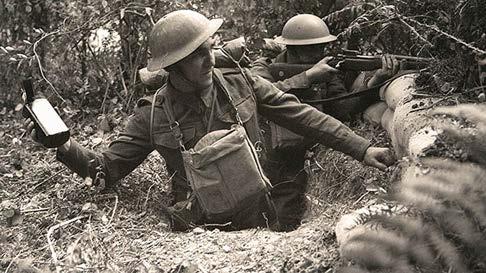
Part-Time UK £4,500 International £7,848
Associate Students UK £3,240 International £5,616
The University’s academic year, which begins in October, has four Terms and fees are charged on a termly basis. The sums listed above are the totals for the full year. There is no additional charge for the seminars and dinners.
Professor Gary Sheffield is one of Britain’s leading military historians. He specialises in the military and social history of the armies of Britain and the British Empire in the twentieth century, especially the First World War. His many publications include The Chief: Douglas Haig and the British Army (shortlisted for the Westminster Medal for Military Literature); the best-selling Forgotten Victory: The First World War – Myths and Realities; and
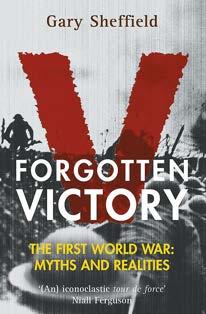
Leadership in the Trenches: OfficerMan Relations, Morale and Discipline in the British Army in the Era of the First World War. He is writing Civilian Armies: The Experience of British and Dominion Soldiers in the Two World Wars, for Yale University Press. Gary Sheffield is Professor of Military History at the University of Buckingham, and President of the Western Front Association

Andrew Thompson, MA (with distinction), 2021: ‘I found Buckingham’s MA in Military History by Research a very rewarding experience. After a business career in the technology sector, I was able to finally devote some time to my passion for Military History. The task seemed daunting at first as it had been a long time since I was last in education and I had no knowledge of how to conduct historical research. However, the introductory course of lectures provided a solid study framework and detailed follow-up discussions with my tutor enabled me to focus in on a specific historical area of interest and, more importantly, identify a particular question that needed answering.
together the parts of your chosen puzzle. The course is demanding and academically rigorous with a high standard of work expected. However, the tutors are excellent and always there to support and guide your progress and check your work is of the required standard. Writing the dissertation is challenging, but once completed it is a very satisfying feeling to know you have contributed to the historiography and understanding of your chosen area.
‘The research-based nature of the course means at this point you embark on a solo process of discovery. Reading the existing literature and sifting the archives, both online and in person, you follow leads and gradually piece
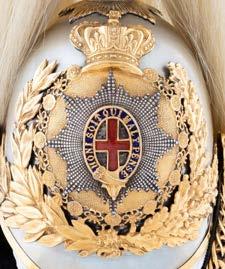
‘Whilst most students in my intake took the one-year full-time course I undertook the two-year part-time route and found it allowed me the time and space to investigate my chosen specialist area and really enjoy the
whole process without pressure. If you have the time, it may be an option to consider. If undertaking a Master’s currently seems too much of a commitment, I would highly recommend becoming an Associate Student just to attend the MA course’s accompanying series of illuminating evening events hosted by Professor Saul David. Each evening involves a standalone lecture given by an eminent historian followed by a dinner and conversation. It is highly enjoyable to spend time in the company of a diverse group of people with a common passion and to be able to talk to some of the biggest names in Military History. Even though I have completed my Master’s I intend to be an Associate Student for many years to come’.
Scott Sherriff, MA (with distinction), 2020: ‘The MA by Research in Military History at the University of Buckingham offers students the opportunity to channel their passion and intellectual curiosity into an academic endeavour full of reward. The research
seminars equip the student early on with a solid foundation to build on, along with a road map to begin drawing out one’s chosen topic. Accompanying these are lectures from speakers at the apex of their field, which are both informative and inspiring, set within a
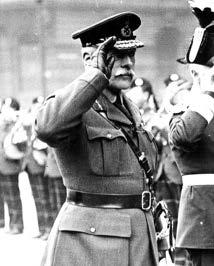
comfortable environment conducive to open debate. Moreover, the student support at Buckingham is second to none, with administrators on hand to answer any questions and avoid any pitfalls emerging, along with librarians available to assist in seeking out rare books. Taken together, the MA by Research in Military History guarantees a unique experience and provides the
necessary tools to succeed. I thoroughly enjoyed the course and found the whole experience both character building and rewarding. It provided an excellent platform to develop a keen interest into an extensive academic project, under the watchful eyes of expert supervision.
I look forward to my next project within this space.’
Dr Andy Boyd, PhD, 2015: ‘I completed the one-year Research MA in Military History in 2012 and subsequently went on to complete a PhD also at the University of Buckingham. Like most students, I embarked on the MA course with a longstanding interest in Military History, but little understanding of the skills and disciplines involved in academic research.
question that is entirely new and to produce a work that can withstand rigorous professional scrutiny within an incredibly short timescale.
The unique and exciting quality of the Buckingham programme is that it enables an interested amateur as I certainly was then to tackle a historical
‘If the opportunity provided by the Buckingham course is exciting, its strength lies in the way it combines three elements which support and guide the student. The first is a well-crafted introduction to research techniques backed by exercises to develop research and writing skills. This element is relevant and practical and it is adjusted to the needs of the individual. The second is the series of general interest
lectures over the first half of the year all provided by first rank historians. These expose students to new historical problems and the latest research and the format over dinner allows genuinely stimulating debate. They provide invaluable context for the student’s individual work. However, the critical element that stands out at Buckingham is the quality of the individual guidance and supervision in selecting a research topic and then executing successive stages. I cannot rate too highly the individual supervision that I and my fellow students received. I think PhD students
at the best universities would count themselves fortunate to receive the tailored support of this quality and care and not least time from some of the best historians in the United Kingdom.
‘I would also like to commend the general administration of the Buckingham MA programme. It is a complex programme with diverse students with different requirements. Yet the execution from logistics around successive lectures through to the examination of the final thesis and the monitoring of academic standards was close to perfect.’
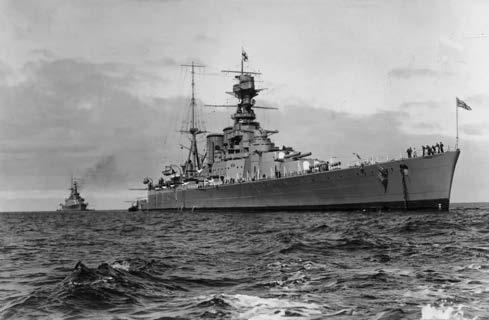
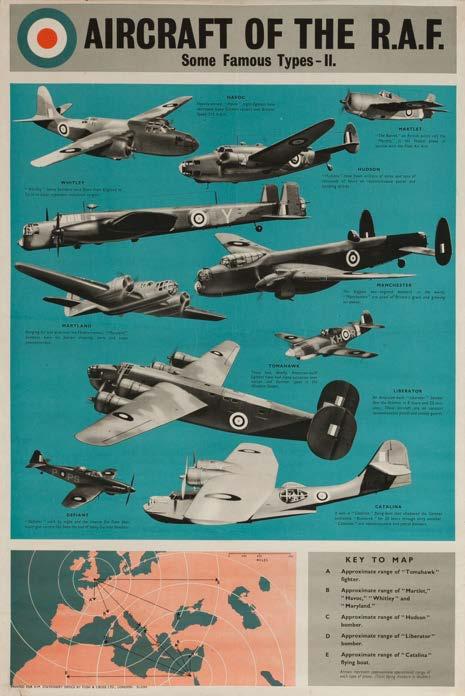
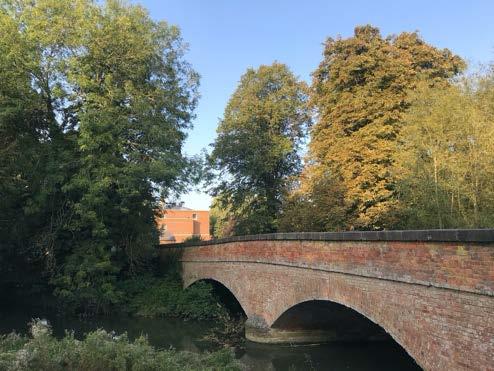
Founded in 1973 as a university college
‘on the pattern of [the] great private foundations in the USA’, Buckingham was granted full university status, with the power to confer degrees by royal charter, in 1983 the first independent university created since the 19th century. It is the only private university in the United Kingdom incorporated by royal charter.
From the start, the university was distinctive for its commitment to individual and small-group tutorial teaching, for the eminence of its academic body, and for its prizing of independence of thought and academic freedom. It currently has just over 3,000 students, almost evenly divided by undergraduates and graduate scholars.
The university is located in the centre historic market town of Buckingham on a fine campus surrounded on three sides by the Great Ouse River, with extensive lawns and gardens. Much of the fabric of the university and the surrounding town in medieval, with a notable series of buildings surviving from the 18th century. For teaching purposes, the university also maintains offices in central London, in Gower St, Bloomsbury, which are used for tutorials and occasional seminars. The environs of the town are renowned for the distinction of the historic houses
nearby. Stowe House, former seat of the Dukes of Buckingham and Chandos, lies within walking distance of the main campus and offers one of the finest 18th-century, classically-inspired landscapes in the whole of Europe.
Above: the university’s Tanlaw Mill, a converted 19th-century mill which now houses the student bar and gymnasium.
Opposite page: the Vinson Building, viewed from the university bridge across the Great Ouse.
